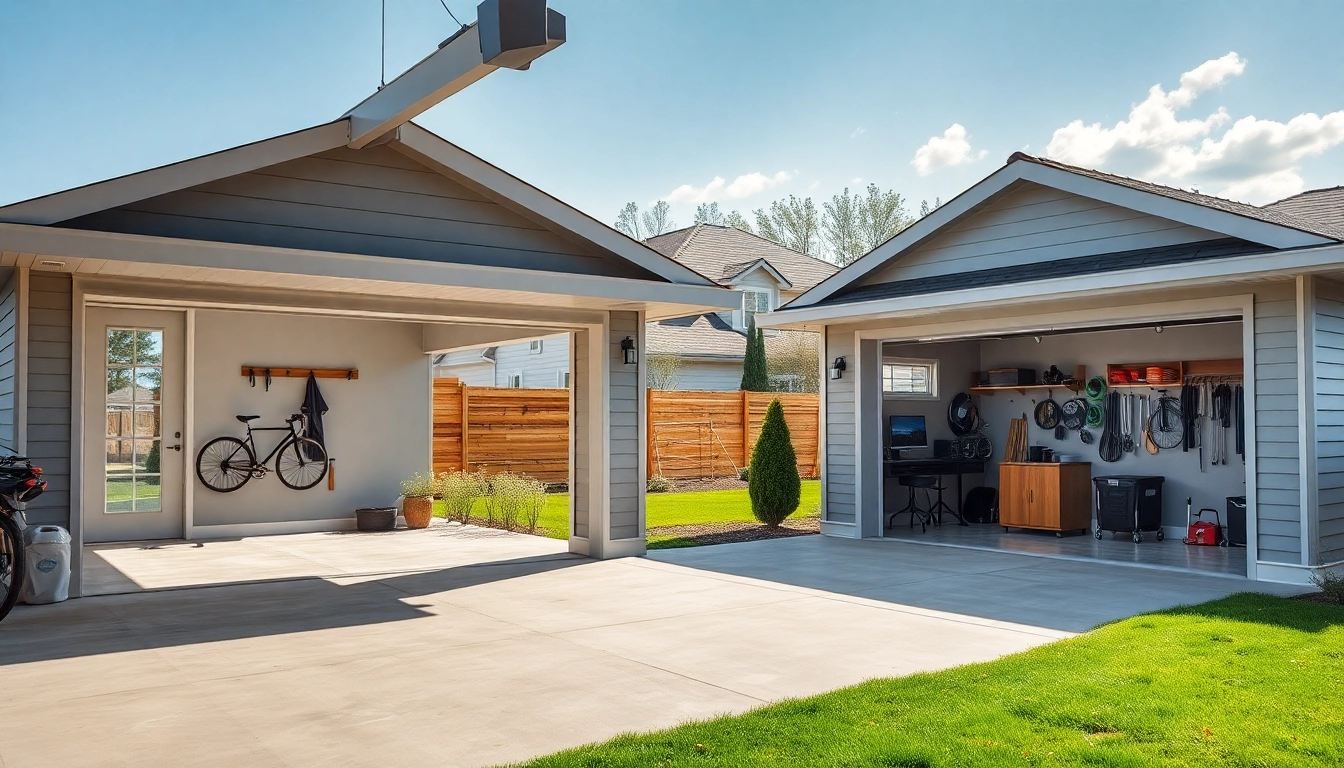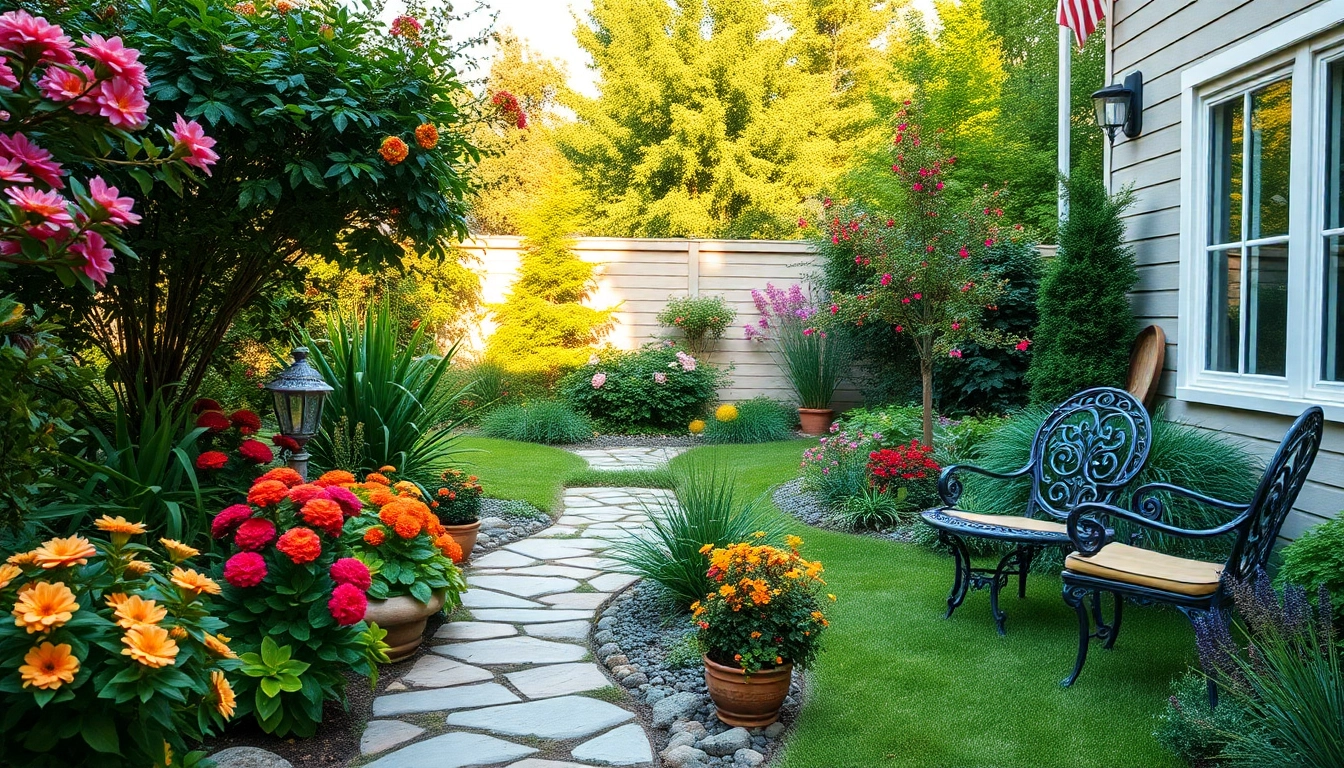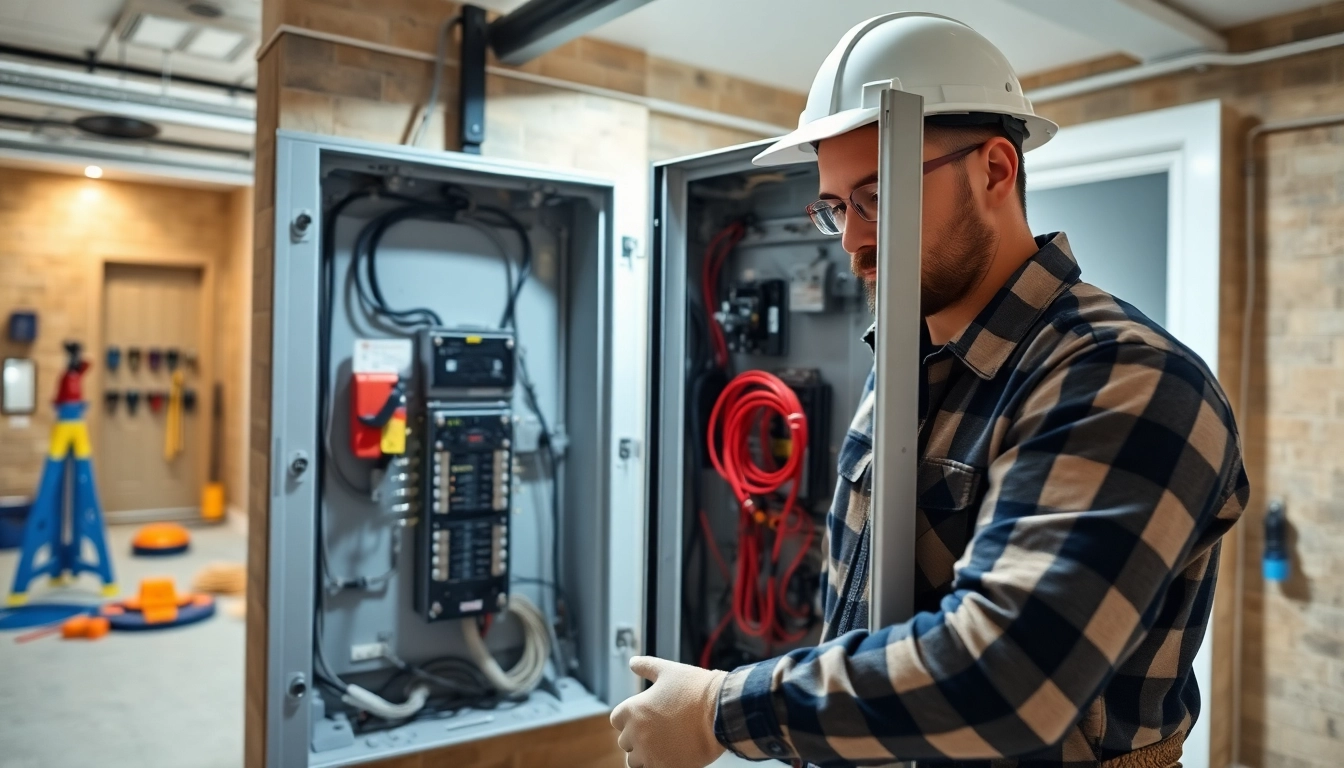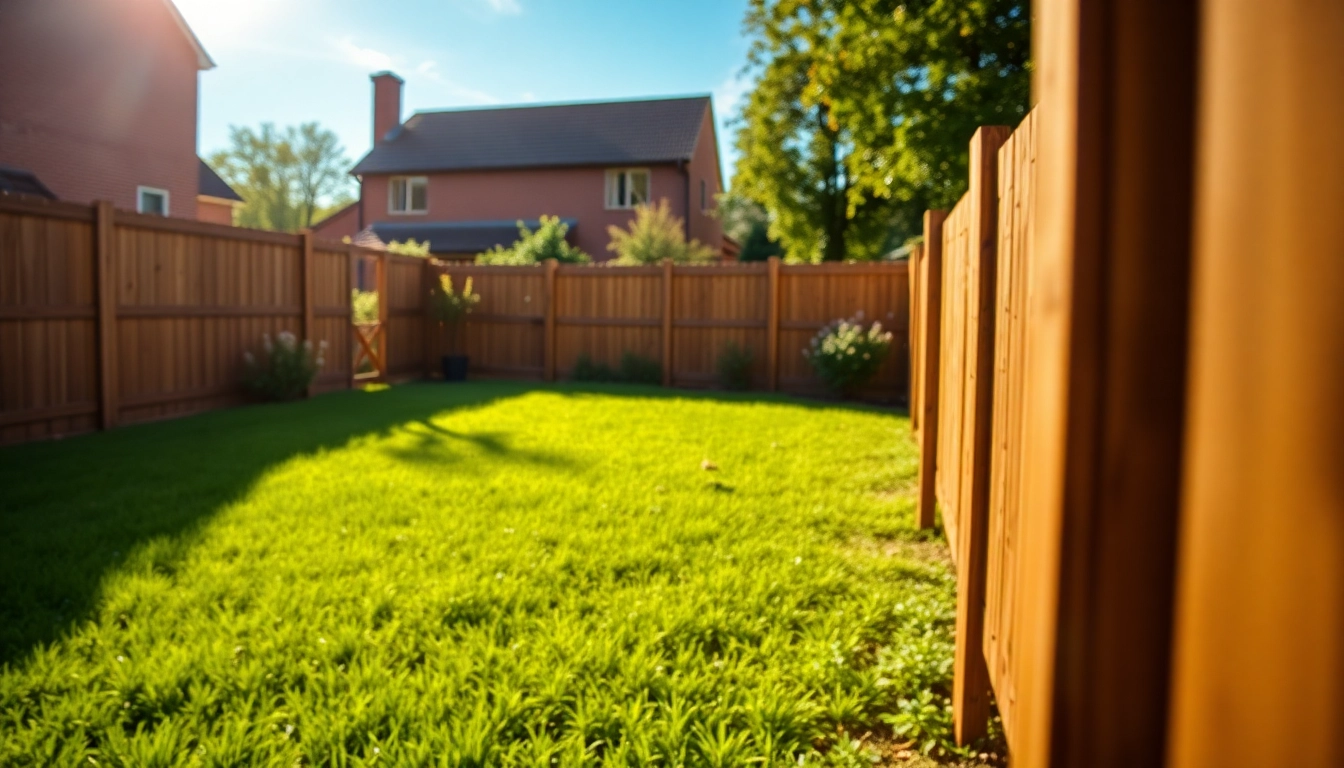Understanding Custom Garages
What Are Custom Garages?
Custom garages are tailored spaces designed to meet the specific needs and preferences of homeowners. Unlike standard garages, which often come in fixed sizes and designs, custom garages allow for extensive personalization. This may include unique architectural styles, specialized storage solutions, integrated workspaces, or recreational areas. The customization process generally considers the homeowner’s lifestyle, vehicle types, and intended use of the space.
Benefits of Custom Garages
Investing in a custom garage brings a multitude of benefits that extend beyond mere aesthetics. First, these garages provide tailored storage that effectively organizes tools, vehicles, and personal items, enhancing accessibility and efficiency. Furthermore, a well-designed custom garage can significantly increase property value, making it an attractive feature for potential buyers.
Additionally, custom garages can serve various purposes: from workshops for hobbies to car shows or even guest houses. Their versatility allows homeowners greater freedom to utilize space as they see fit, catering to changing needs over time. Furthermore, with the incorporation of modern technology, custom garages can be smart spaces equipped with security features, climate control, and energy-efficient solutions.
Key Features to Consider
When planning for a custom garage, several features should be taken into account:
- Size and Layout: The dimensions should accommodate vehicles while leaving room for movement and additional storage.
- Storage Solutions: Custom cabinets, shelves, and modular storage units can maximize space efficiency.
- Heating and Cooling: For garages intended for long-term use or as workshops, adequate climate control is vital.
- Flooring Options: Durable, easy-to-clean surfaces, such as epoxy or tile, can endure the wear and tear of heavy use.
- Lighting: Proper lighting is crucial, especially in work areas. Consider natural light in addition to artificial options.
- Security Features: Incorporating surveillance systems, reinforced doors, and alarms can protect valuable vehicles and tools.
Design Considerations for Custom Garages
Choosing the Right Style
Designing a custom garage begins with determining the architectural style. Whether you prefer contemporary, traditional, or rustic designs, the garage’s appearance should complement the overall look of the home. For example, a sleek modern house may pair better with a minimalist garage featuring clean lines and glass doors, while a colonial-style home would suit a more gabled structure.
Moreover, the integration of aesthetics with functionality can create a harmonious balance. Use of materials like wood, stone, or metal can enhance the overall visual appeal while retaining durability.
Optimizing Space Functionality
Efficiency in space utilization is crucial for a custom garage. Carefully consider the layout to ensure that it meets your functional requirements. For instance, if the garage will double as a workshop, allocate enough space for workbenches and tools without compromising vehicle storage. Zones should be created within the garage for various activities, separating work, storage, and leisure areas.
Additionally, decluttering essentials through modular storage solutions can make a significant difference. Utilize vertical space with shelving units and pegboards while ensuring easy access to necessary tools and equipment.
Color and Material Choices
The choice of colors and materials for your custom garage can significantly influence both its aesthetic appeal and long-term maintenance. Light colors can make spaces feel larger and more inviting, while darker hues may provide a modern touch. The materials selected should not only match your design preferences but also withstand the elements and provide durability.
Common materials used include:
- Wood: A classic choice that can be painted or stained for a personalized look.
- Metal: Ideal for modern designs; offers durability and a sleek finish.
- Composite: Environmentally friendly options that can mimic other materials while providing excellent durability and maintenance.
Installation Process for Custom Garages
Planning and Preparation Steps
The installation of a custom garage requires meticulous planning and preparation. Start by identifying your objectives and how you envision utilizing the space. Engage in discussions with family members to gather insights about needs and preferences. This collaborative approach ensures that the final design reflects the collective lifestyle.
After defining requirements, it’s essential to set a budget. This budget should encompass construction costs, materials, labor, and possible permits. Conducting thorough research might also reveal alternative materials or design options that could reduce costs without sacrificing quality.
Creating blueprints or CAD designs can also help visualize the project and make adjustments before construction begins. Consider consulting with design professionals for a polished plan that adheres to your specifications.
Working with Professionals
Collaborating with experienced contractors and designers is pivotal. Professionals can provide valuable insights on structural integrity, building codes, and material selection. When selecting a contractor, verify their credentials and previous work to ensure they align with your vision and quality expectations.
Establish a communication plan with your contractor and set clear timelines and milestones to ensure project transparency and efficiency. Regular check-ins can mitigate issues early, saving time and resources.
Permit and Building Code Requirements
Depending on where you live, constructing a custom garage may require permits and adherence to local building codes. It’s vital to understand these regulations before beginning the project. The process typically involves submitting plans to your local building authority, which can provide information regarding necessary inspections and compliance guidelines.
Ignoring legal requirements can lead to fines or mandatory alterations, potentially delaying the project. Thus, consultation with a contractor who understands local regulations can help streamline the application process.
Maintenance Tips for Custom Garages
Regular Upkeep and Cleaning
Maintenance is critical in extending the life of your custom garage. Regular cleaning should incorporate sweeping, wiping surfaces, and washing walls and floors to eradicate dust and grime. Establish a cleaning schedule to prevent buildup, particularly in high-use areas like workshops or storage zones.
Additionally, ensure that any appliances or systems, such as heaters or insulation, are functioning efficiently through occasional servicing. A well-maintained garage can sustain the value of your property and provide you with a safe, functional space.
Inspecting for Wear and Tear
Periodically inspecting your garage for wear and tear can save you from larger repair costs down the line. Look for signs like rust on metal components, cracks in the flooring, or peeling paint. Early detection allows for timely repairs, which can also enhance the functionality and appearance of the space.
Assess critical areas such as doors and windows for seals and hinges, ensuring they operate smoothly. Checking ventilation systems is also vital to maintain a safe environment, especially if using the garage for extensive projects or as a workspace.
Upgrading Features Over Time
As needs evolve, so too can the features of your custom garage. Long-term ownership should include considerations for upgrades—whether it’s adding more storage, enhanced security systems, or even integrating smart technology solutions. Evaluating these upgrades periodically ensures that your garage remains functional and comfortable.
Discuss potential expansions with professionals to understand feasibility, costs, and potential value returns. Updating features can not only improve overall functionality but also keep your garage appealing should you decide to sell your property.
Maximizing the Value of Your Custom Garage
Real Estate Market Impact
A custom garage can be a powerful asset in real estate. Many homebuyers actively seek properties with specialized garages that meet their needs for storage, hobbies, or workspaces. Incorporating thoughtful design and high-quality materials increases your property value significantly, offering a return on investment that particularly benefits those in competitive housing markets.
Research indicates that homes with custom garages often sell faster than those without, underscoring the importance of this feature. Market trends should inform your design decisions to align with what prospective buyers are seeking.
Custom Garages as Functional Spaces
The versatility of custom garages adds significant value. Beyond being simply a vehicle shelter, these spaces can facilitate numerous activities—workshops for DIY enthusiasts, storage for athletic gear, or even gym spaces for fitness aficionados. By customizing the garage to enhance functionality, homeowners can attract a broader audience during resale.
Consider the potential uses of your garage carefully. Creating specialized zones for multiple functions can maximize utility without compromising space or comfort. This thoughtful planning makes the garage not just a utilitarian space, but a lifestyle enhancement.
Enhancing Curb Appeal
Finally, a custom garage can dramatically boost your home’s curb appeal. A well-considered design with harmonious colors and materials can make the garage a focal point in the property’s exterior, enhancing overall aesthetic value. Features such as decorative doors, attractive landscaping, or artistically arranged lighting can significantly elevate the first impression of your home.
Plan for the exterior design of your garage to reflect your personal style while remaining cohesive with your home’s architecture and neighborhood. This attention to detail can ensure that your custom garage remains more than just a utility; it becomes a true enhancement to your property’s appeal.



